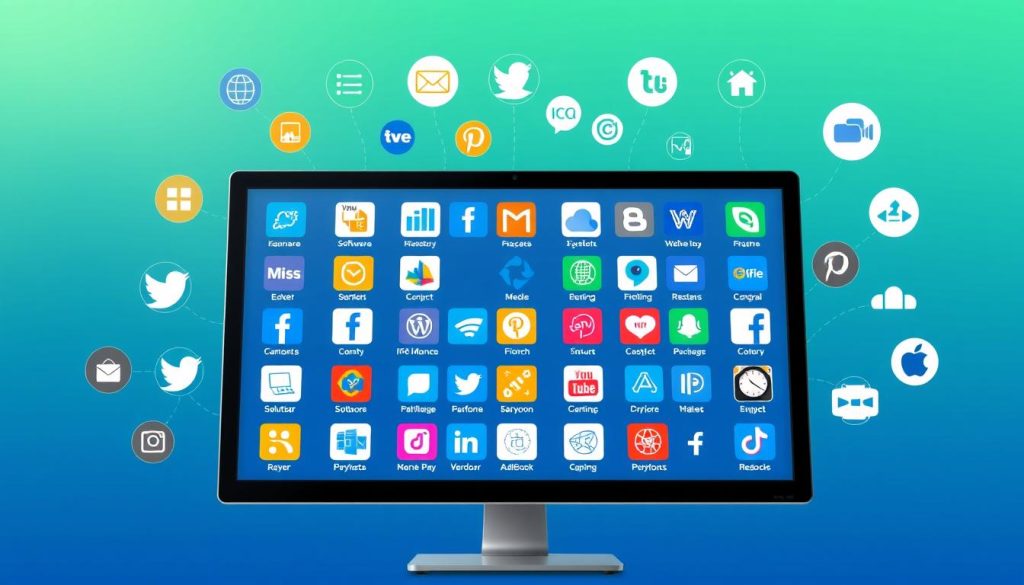Promoting software in a crowded market can be tough, especially without a big budget. But don’t worry! There are many ways to boost your software’s visibility without paid ads.
This article will show you cost-effective, organic tactics to reach your target audience. You’ll learn how to make your software stand out and attract more users.
Key Takeaways
- Leverage social media platforms to engage with your target audience and build brand awareness.
- Optimize your website for search engines to improve organic traffic and discoverability.
- Collaborate with industry influencers to tap into their established followings and enhance your credibility.
- Participate in online communities and forums to connect with potential customers and gather valuable feedback.
- Offer free trials and demos to give potential customers a hands-on experience with your software.
Understanding the Importance of Software Promotion
Software promotion is vital in today’s competitive landscape. Companies must find creative ways to showcase their products without paid ads. This section explores why promotion matters and the challenges companies face.
Effective promotion helps build brand identity and increase market visibility. It also makes it easier for potential customers to discover products. Software companies need promotion to stand out in a crowded market.
Why Software Needs Promotion
Promoting software is crucial for several reasons:
- Increasing Brand Awareness – Effective promotion helps software companies build a strong brand identity and increase their visibility in the market, making it easier for potential customers to discover and remember their products.
- Driving User Acquisition – Promotion strategies, such as content marketing and social media outreach, can help software companies reach and engage with their target audience, ultimately converting them into paying customers.
- Standing Out in a Crowded Market – With the software industry becoming increasingly saturated, promotion is essential for software companies to differentiate themselves from their competitors and capture the attention of their audience.
The Challenges of Promoting Software Without Ads
Software companies face unique challenges when promoting without paid advertising. These obstacles require creative solutions and strategic thinking.
- Limited Resources – Many software companies, especially startups and small businesses, have limited budgets and personnel, making it difficult to invest in extensive marketing campaigns.
- Intense Competition – Software companies must compete with larger, well-established players with deep pockets and extensive marketing resources, making it challenging to stand out in the crowd.
- Reaching the Right Audience – Identifying and effectively reaching the software’s target audience can be a significant challenge, especially without the targeting capabilities that paid advertising provides.
Companies must use organic and low-cost tactics to build brand awareness. These strategies help drive user acquisition and set them apart in the market. Patience and creativity are key to successful software promotion.

Leveraging Social Media for Software Promotion
Software companies must use social media to promote their products effectively. These platforms allow businesses to create engaging content and build a strong brand presence. They can also connect with potential customers and industry influencers.
Creating captivating content is key for software promotion on social media. Businesses should craft posts showcasing their software’s features and benefits. This can include product demos, user testimonials, or educational tutorials.
Building a robust social media presence is crucial. Software companies should maintain a consistent brand identity across all channels. This helps reinforce the brand’s credibility and trustworthiness to the target audience.
Connecting with potential customers and industry influencers can boost software promotion. Actively engaging with followers and responding to comments cultivates a loyal community. Collaborating with relevant influencers can expand reach to new audiences.
| Social Media Platform | Key Strategies |
|---|---|
|
|
|
|
|
Effective use of social media platforms can boost a software company’s visibility. It helps foster meaningful connections with the target audience. This approach can drive successful software promotions without paid advertising.

“The power of social media in software promotion cannot be overstated. It’s a game-changer for businesses looking to connect with their audience and drive real results.”
Building a Strong Online Presence
A strong online presence is vital for software companies today. A well-optimized website and engaging content can boost visibility and attract your target audience. These strategies go beyond just maintaining social media accounts.
Optimizing Your Website for Search Engines
Search engine optimization (SEO) is key for improving website discoverability. It enhances search rankings and helps potential customers find your software solutions easily. SEO includes keyword research, on-page optimization, and technical improvements.
These efforts ensure your website is fast and mobile-friendly. They also make it easy for search engines to crawl your site.
Creating Engaging Content for Your Target Audience
High-quality, informative content can greatly boost your online presence. This includes blog posts, product guides, tutorials, and case studies that offer value to your audience.
Sharing your expertise helps build trust with potential customers. It also establishes your brand as a thought leader in the industry.
“The key to a successful online presence is not just having a website, but creating a digital experience that truly resonates with your target audience.”
Focusing on SEO and content creation helps software companies build a strong online presence. This approach drives more visibility, traffic, and conversions for your business. It creates a digital experience that truly connects with your audience.
How To Promote Software Without Paid Ads
Software companies face challenges promoting products without paid advertising. However, effective strategies can help reach target audiences and drive sales affordably. These methods can boost visibility and attract customers without breaking the bank.
Social media is a powerful tool for software promotion. Platforms like LinkedIn, Twitter, and Facebook help build a strong online presence. Companies can engage audiences and share valuable content showcasing product features and benefits.
This approach raises brand awareness and fosters community around the software. It can lead to increased loyalty and word-of-mouth marketing. These benefits help grow the customer base organically.
Building a strong online presence through SEO and content marketing is crucial. Optimizing websites for search engines improves visibility in organic results. This makes it easier for potential customers to find and learn about products.
Creating engaging content like blog posts, videos, and webinars is essential. It positions the company as an industry thought leader. This approach attracts a loyal following and builds trust with potential customers.
| Strategy | Benefits | Examples |
|---|---|---|
| Social Media Promotion | – Increased brand awareness – Engaged community – Word-of-mouth marketing |
– Sharing product updates on LinkedIn – Hosting Twitter chats with industry experts – Leveraging Facebook groups to connect with users |
| Content Marketing | – Improved search engine visibility – Thought leadership positioning – Attracting a loyal audience |
– Publishing insightful blog posts – Creating educational video tutorials – Hosting informative webinars |
Combining these strategies can effectively promote software products without paid advertising. This approach drives more leads, sales, and long-term success. It’s a sustainable way to grow your software business.

“The most effective way to grow your software business is to focus on creating value for your customers, not just selling to them.”
Utilizing Email Marketing Strategies
Email marketing is a powerful tool for software companies to promote their products. It helps build a targeted audience and drive conversions. This section explores how to leverage email marketing effectively.
Building an Email List
A robust email list is crucial for successful email marketing. Software companies should attract subscribers interested in their products. They can offer valuable content, free trials, or exclusive promotions in exchange for email addresses.
Here are some strategies to build a targeted email list:
- Incorporate email signup forms on their website, highlighting the benefits of joining the mailing list.
- Participate in industry events and conferences, collecting email addresses from interested attendees.
- Collaborate with complementary businesses or influencers to co-promote email list building initiatives.
- Leverage social media platforms to engage with their audience and encourage email subscriptions.
Crafting Effective Email Campaigns
Creating engaging email campaigns is the next step after building an email list. A strategic approach is necessary to resonate with the audience and drive action.
Key elements of successful email campaigns include:
- Compelling Subject Lines: Craft attention-grabbing subject lines that pique the recipient’s interest and encourage them to open the email.
- Personalized Content: Tailor the email content to the specific needs and interests of the recipient, making it more relevant and valuable.
- Clear Calls-to-Action: Include prominent calls-to-action that guide the recipient towards the desired conversion, such as signing up for a free trial or making a purchase.
- Captivating Visuals: Incorporate visually appealing graphics, images, or videos to enhance the overall engagement and effectiveness of the email campaign.
- Optimized Timing and Frequency: Analyze the engagement patterns of the email list and adjust the timing and frequency of campaigns to maximize their impact.

These email marketing strategies can help software companies promote their products effectively. They can build strong relationships with their target audience. This approach drives measurable conversions and boosts overall success.
Collaborating with Industry Influencers
Promoting software without paid ads can be tough. However, teaming up with industry influencers can make a big difference. Their credibility can boost your software’s visibility and trustworthiness.
Start by finding the right influencers. Look for people with a large following in your industry. Check if their values match your brand. Consider their engagement rates and audience relevance.
Build relationships with potential influencers. Offer to work together on content. Give them special access to your software. Explore other ways you both can benefit.
- Reach out to potential influencers and build a relationship. Offer to collaborate on content, provide exclusive access to your software, or explore other mutually beneficial arrangements.
- Encourage influencers to share your software with their audience, whether through product reviews, social media posts, or other promotional activities.
- Continuously monitor the performance of your influencer collaborations and make adjustments as needed to ensure the partnership is driving results.
Ask influencers to share your software with their followers. They can do product reviews or social media posts. Keep track of how well these partnerships work. Make changes if needed to get better results.
Working with influencers can greatly increase your software’s visibility. This can lead to more leads and sales without paid advertising.
| Influencer | Audience Size | Engagement Rate | Relevance to Software |
|---|---|---|---|
| John Smith | 50,000 | 8% | High |
| Jane Doe | 75,000 | 6% | Medium |
| Alex Johnson | 30,000 | 11% | High |
“Collaborating with industry influencers has been a game-changer for our software’s promotion. We’ve seen a significant increase in brand awareness and lead generation without relying on expensive paid ads.”
– Sarah Williams, Marketing Manager at SoftwareCo
Participating in Online Communities
Promoting software without paid ads can be tough. Engaging with online communities is an effective strategy. Forums, Reddit, and LinkedIn groups offer chances to connect with your audience.
These platforms let you build relationships and showcase your software’s value. You can reach potential customers and demonstrate your expertise.
Engaging with Relevant Forums and Groups
First, find forums, subreddits, and LinkedIn groups relevant to your software. Look for active discussions about your product’s features and benefits. Understand each community’s culture and rules before participating.
Provide thoughtful answers to questions and concerns. Share helpful content like tutorials and industry insights. Build connections by offering advice and responding to comments.
- Engage in discussions by providing thoughtful, value-added responses to questions and concerns.
- Share relevant, high-quality content that educates and informs your audience, such as tutorials, industry insights, or product updates.
- Build relationships by connecting with community members, offering helpful advice, and responding to comments and messages.
- Avoid overtly promoting your software, as this can be seen as spam and damage your credibility within the community.
Consistently add value to these communities. This builds trust and generates interest in your software. It also creates lasting relationships with potential customers.
| Online Community | Potential Benefits | Engagement Strategies |
|---|---|---|
|
|
|
| LinkedIn Groups |
|
|
Active community engagement brings many benefits. You can promote your software and gain market insights. It helps build customer relationships and establish you as an industry expert.
Attending Industry Events and Networking
Industry events are a powerful way to promote software products. These gatherings connect you with potential customers, influencers, and fellow professionals. They offer a chance to showcase your software and expand your reach.
These events provide a platform to demonstrate your software’s features. You can generate interest and foster meaningful connections with your target audience. They also allow you to network and exchange ideas with like-minded individuals.
Networking at these events can lead to valuable relationships. Approach interactions with genuine interest in others’ experiences. This can result in mutually beneficial partnerships and collaborations.
- Effective Networking: Industry events are ideal for making valuable connections. Meet potential customers, experts, and fellow developers. Show genuine interest in their perspectives to build lasting relationships.
- Showcasing Your Software: Use events to highlight your software’s unique features and benefits. Engage with attendees and demonstrate your product. Gather feedback to inform future enhancements.
- Gaining Insights: Stay updated on the latest trends and innovations in your field. This knowledge can shape your marketing strategies and product development decisions.
- Fostering Collaborations: Network to find potential partners or collaborators. These connections can expand your software’s reach and visibility in the market.
Active participation in industry events promotes your software effectively. It helps build valuable connections within your target market. These gatherings can be a game-changer for your promotion efforts.
| Event Type | Potential Benefits | Networking Strategies |
|---|---|---|
| Industry Conferences |
|
|
| Software Meetups |
|
|
| Local Networking Events |
|
|
Industry events help software companies promote their products effectively. They build valuable connections and establish leadership in their fields. Approach these gatherings with a desire to learn, share, and collaborate.
This approach can drive growth and success for your software business. Remember to follow up with new contacts after the event. Nurture these relationships to maximize the benefits of your networking efforts.
Offering Free Trials and Demos
Free trials and demos are powerful tools for software promotion. They let users experience the software firsthand. This strategy helps drive adoption and boost conversions.
Free trials offer many benefits to potential customers. Users can test the software without spending money. They can evaluate if it meets their needs.
Hands-on experience is crucial for decision-making. It shows the software’s usability, features, and performance in action.
To market free trials effectively, create a smooth user experience. Make the signup process simple and provide clear instructions. Offer support to help customers during their trial.
Promote your free trials across various channels. Use your website, social media, and email to reach potential customers. Encourage them to try your software.




